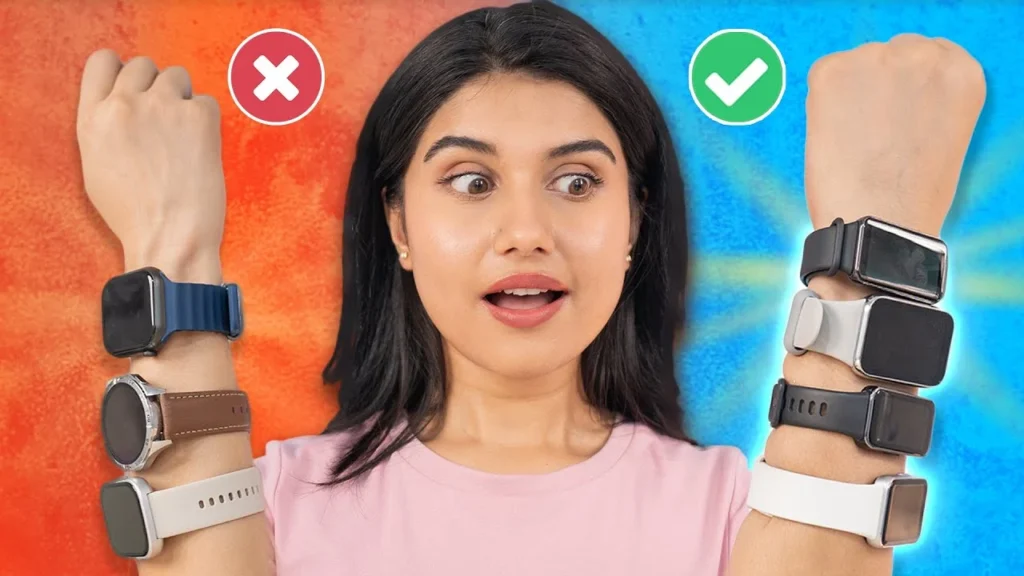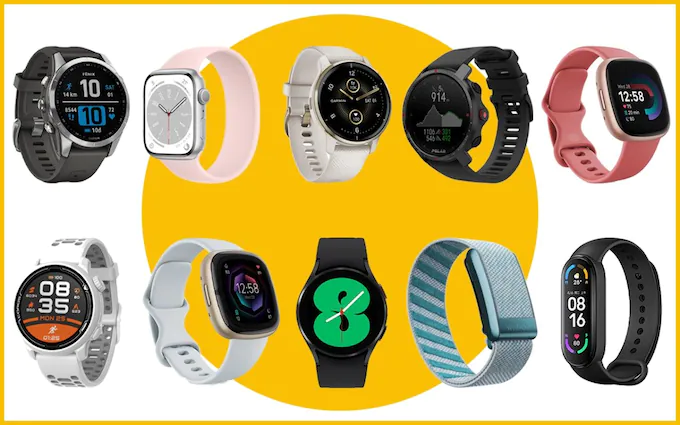Fitness trackers are gadgets you can wear to monitor your health and fitness levels. These devices provide real-time data on your heart rate, steps taken, calories burned, and sleep quality, allowing you to track and optimize your overall wellness.
Table of Contents
Benefits Of Fitness Trackers
Fitness trackers are more than just cool gadgets; they give people control over their fitness and health. They offer numerous advantages, from staying motivated to setting and tracking fitness goals, all tailored to your specific needs.
Stay motivated by instantly monitoring your progress on your fitness tracker.
- Calories burned
- Steps taken
- Heart rate fluctuations
Use this data to make real-time adjustments to your workout routine.
You can set your own fitness goals with fitness trackers, which is one of their best features. Whether you’re aiming to lose weight, improve cardio fitness, or increase your daily step count, a fitness tracker can be tailored to your specific needs.
- Customize daily step targets.
- Track sleep patterns
- Receive reminders to move
Adjusted goals ensure consistent progress toward a healthier lifestyle.
Choosing The Best Fitness Trackers 2024

One critical aspect of maintaining a healthy lifestyle is staying physically active. Fitness trackers have become an essential tool for many to help them track their progress and stay motivated. But because there are so many choices on the market, it can take time to pick the right fitness tracker. To make this decision easier for you, consider your fitness goals and the features you need in a fitness tracker.
Consider Your Fitness Goals
Before exploring the features, it’s crucial to understand your fitness goals clearly. Are you looking to lose weight, improve cardio fitness, or increase your daily step count? Figure out your main goal. This will help you choose a fitness tracker that meets your needs.
If you are aiming for weight loss, look for a fitness tracker that includes a calorie counter and tracks your heart rate during workouts. If you want to improve your cardio fitness, look for trackers that have GPS built-in and can keep track of different activities like running, cycling, and swimming.
| Fitness Goal | Recommended Features |
| Weight Loss | Calorie counter and heart rate monitor |
| Cardio Fitness | Built-in GPS and activity tracking |
| Step Count | Accurate step-tracking |
Features To Look For
Once you have identified your fitness goals, it’s time to shift your focus to the features that will enhance your tracking experience. Here are some key features to consider when choosing a fitness tracker:
- Battery Life: Look for a fitness tracker with a long battery life so you don’t have to worry about constant charging interruptions.
- Water Resistance: If you enjoy swimming or want a tracker that can withstand sweat during intense workouts, opt for a water-resistant model.
- • Compatible: Make sure the fitness tracker you pick works with your phone’s operating system so you can easily sync and keep track of your data.
- Heart Rate Monitoring: A built-in heart rate monitor enables you to monitor your heart rate during workouts closely, helping you optimize your training sessions.
- • Activity Tracking: To monitor your daily activity, look for a tracker that counts your steps, distance traveled, and calories burned.
- • Sleep Tracking: If you need to monitor your sleep patterns, you might want to consider a fitness tracker that tracks the quality and length of your sleep.
By considering these crucial features, you can ensure that you choose a fitness tracker that fits your requirements, both in terms of fitness goals and desired functionalities.
Maximizing Your Workouts
Maximizing your workouts is essential to achieving your fitness goals. Fitness trackers are valuable tools that can help you make the most of your exercise routines. In this article, we’ll explore how to utilize fitness trackers to their full potential and enhance the effectiveness of your workouts.
Setting Smart Goals
When using fitness trackers, setting SMART (specific, measurable, achievable, relevant, and time-bound) goals is crucial. By establishing clear objectives, you can track your progress more effectively and stay motivated. Whether it’s increasing your step count, improving your heart rate during cardio sessions, or reaching a specific calorie burn, SMART goals provide a clear roadmap for your fitness journey.
Utilizing Heart Rate Monitoring
Fitness trackers with heart rate monitoring are handy because they let you see how hard your workouts are. By regularly checking your heart rate zones during exercise, you can ensure that you’re maximizing your cardiovascular effort and burning calories efficiently. This information allows you to adjust your workout intensity in real time, ensuring that you’re consistently challenging yourself and making the most of each session.
Integrating Technology For Better Results

Discover the power of fitness trackers in revolutionizing your workout routine – leveraging technology to achieve peak performance. Seamlessly sync data for personalized tracking, analysis, and motivation, ensuring optimal results and enhanced fitness goals. Transform your fitness journey with cutting-edge technology at your fingertips.
Integrating technology into today’s busy world has completely changed the fitness industry, giving people a huge range of tools to track and improve their workouts. Fitness trackers have become very popular because they make using technology to improve our health and fitness easy.
From syncing with fitness apps to incorporating activity trackers into our daily routines, these devices are empowering individuals to achieve better results through data-driven insights and personalized feedback.
Syncing with Fitness Apps In the age of smartphones and digital connectivity, fitness trackers have become invaluable tools for individuals looking to streamline their fitness journey through seamless integration with popular fitness apps. If you connect your fitness tracker to apps like Fitbit, MyFitnessPal, or Apple Health, it is easy to combine all of your fitness data, see how you are doing, and learn more about your overall health and wellness.
With this integration, users can access many features from a single platform, such as activity analysis, personalized workouts, and nutritional advice.
Using activity trackers as part of your daily life To get the most out of activity trackers, you need to do more than just wear them. You need to make them a natural part of your daily life to make real changes. Whether you’re tracking your steps, calories burned, or sleep patterns, these devices are always there to remind you to stay active and make healthier choices throughout the day.
By giving users real-time feedback and daily goals, these devices encourage them to do things like take an extra set of stairs, go for a walk during lunch, or choose a longer, more active commute. This turns everyday activities into chances to reach their fitness goals. It’s never been easier to use technology in your workouts, and the rise of fitness trackers has really changed the way we think about health and wellness.
If you connect activity trackers to fitness apps and make them a regular part of your life, you can take charge of your fitness journey and get the most out of data-driven insights, personalized feedback, and new ways to get better results.
Common Mistakes To Avoid
Many users need help with using fitness trackers, which can hinder their progress toward achieving their health and fitness goals. It is essential to know about these mistakes and avoid making them. In this article, we will discuss two common mistakes to avoid when using fitness trackers: over-reliance on tracker data and neglecting other aspects of health.
Over-reliance On Tracker Data
Fitness trackers are powerful tools that provide valuable data on various aspects of our health and fitness. However, one common mistake that people need to correct is overreacting to this data. While it’s essential to track our steps, heart rate, and calories burned, it’s equally important to remember that these numbers are just indicators and not the sole measure of our progress.
There might be times when the tracker fails to measure certain activities or physiological changes within our bodies accurately. We must rely on something other than the tracker’s data and listen to our bodies and how we feel during and after physical activities. There needs to be a balance between trusting the tracker’s data and going with our gut, especially when it comes to setting reasonable goals and knowing our limits.
Neglecting Other Aspects Of Health
While fitness trackers provide valuable information on our physical activity levels, it’s important to remember that health is multidimensional. A common mistake that users make is neglecting other aspects of health, such as sleep, nutrition, and mental well-being.
Remember that achieving optimal health requires a holistic approach. Simply reaching a certain step count or burning a specific number of calories per day is not enough. Our health and well-being can suffer if we do not do important things like deal with stress, get enough good sleep, and eat a balanced diet.
It’s essential to use fitness trackers as a tool to complement other healthy lifestyle choices. Consider using the tracker’s features to monitor your sleep patterns, track your calorie intake, and set reminders for relaxation or mindfulness activities.
The best way to get the most out of fitness trackers is to be open-minded about your overall health and avoid ignoring other aspects of it.
Success Stories
Find motivational success stories of people who have done amazing things with fitness trackers.
Achieving Fitness Milestones With Trackers
Trackers help users reach their fitness goals by providing real-time data and motivation.
- Increase motivation with progress tracking.
- Go over your daily goal of steps and calories burned.
- Celebrate reaching milestones along the way.
Transforming Workouts With Data Insights
Access detailed insights to optimize workouts and enhance performance.
- Analyze heart rate zones during exercises.
- Adjust intensity based on workout data.
- Track progress and adjust strategies for improvement.
Frequently Asked Questions For Fitness Trackers
How do fitness trackers measure daily activity?
Fitness trackers use accelerometers and algorithms to track steps, distance, and calories burned accurately.
Can fitness trackers monitor heart rate during exercise?
Yes, advanced fitness trackers include optical heart rate sensors to monitor your heart rate during exercise.
What Is the Battery Life of Most Fitness Trackers?
Most fitness trackers offer a battery life of 5-7 days, although some can last up to 10 days.
Do fitness trackers offer sleep-tracking features?
Yes, many fitness trackers are equipped with sleep-tracking features to monitor your sleep patterns and quality.
How Can Fitness Trackers Help With Personal Motivation?
Fitness trackers provide real-time feedback, goal setting, and progress tracking to motivate you toward a healthier lifestyle.
Conclusion
Fitness trackers present an incredible opportunity to enhance your fitness journey. These devices have changed the way we reach our health and fitness goals because they have advanced features and are easy to use. By tracking various aspects such as steps, heart rate, sleep, and calories burned, fitness trackers provide valuable insights and motivation to keep pushing forward.
So, whether you are a serious athlete or just want to live a healthier life, getting a fitness tracker can make a huge difference in your health.









Leave a Reply